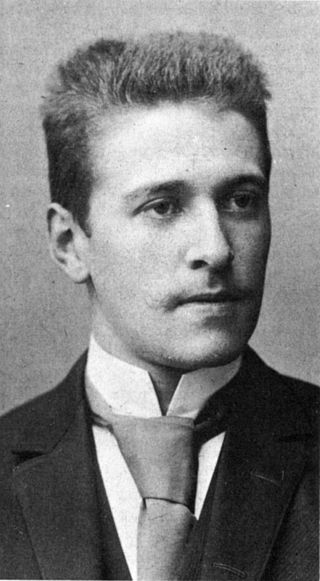Related Research Articles

Hugo Laurenz August Hofmann von Hofmannsthal was an Austrian novelist, librettist, poet, dramatist, narrator, and essayist.

Stefan Zweig was an Austrian novelist, playwright, journalist, and biographer. At the height of his literary career, in the 1920s and 1930s, he was one of the most widely translated and popular writers in the world.

Palais Rothschild refers to a number of palaces in Vienna, Austria, which were owned by members of the Austrian branch of the Rothschild banking family. Apart from their sheer size and elegance, they were famous for the huge collections of valuable paintings, statues, furniture, books and armour that they housed, another reflection of the family's vast wealth and prominent position.
Hans Sedlmayr was an Austrian art historian. From 1931 to 1932 and from 1938 onwards, he was a member of the Nazi Party.

Uwe Kröger is a musical star in the German-speaking countries of the world. Besides starring on stage, Kröger has taken part in galas and concerts, as well as making television and film appearances. He has released cast recordings and solo CDs.

Mark. H. Gelber is an American-Israeli scholar of comparative literature and German-Jewish literature and culture. He received his B.A. magna cum laude and with high honors in Letters and German. He also studied at the University of Bonn, the University of Grenoble, and Tel Aviv University. He was accepted for graduate studies as a Lewis Farmington Fellow in the Humanities and Social Sciences at Yale University and he received his M.A., M.Phil., and Ph.D. from Yale University. In 1980 he accepted an appointment as post-doctoral lecturer at Ben-Gurion University of the Negev, Beer Sheva, in the Department of Foreign Literatures and Linguistics. Except for guest professorships and research fellowships abroad, he has been affiliated there since that time. His research topics include: German-Jewish literature and culture, the literature of exile, cultural Zionism, early Zionist literature and journalism, literary anti-Semitism, autobiography and biography, and literary reception. He lectures frequently at international meetings and conferences in Israel, Europe, China, and the United States. He is presently professor emeritus with active researcher status.
Theodore Illion or Theodor Illion, is a writer of travel books who claimed to have visited Tibet in the 1930s and discovered an underground city there. He published his Tibetan adventures under that name but later resorted to the pseudonyms Theodore Burang or Theodor Burang and more rarely Theodor Nolling to write various books and articles on Tibetan medicine.

Gerhard Zwerenz was a German writer and politician. From 1994 until 1998 he was a member of the Bundestag for the Party of Democratic Socialism (PDS).
Eberhard Keindorff (1902–1975) was a German playwright and screenwriter.
Johanna Sibelius was a German screenwriter.

Ignaz Kirchner was a German actor who made a career on German-speaking stages, especially at Vienna's Burgtheater where he played for 30 years. A character actor, he worked with leading stage directors. He often played opposite Gert Voss, both in classical drama such as Shakespeare's Antonio, with Voss as Shylock, and as Jago, with Voss as Othello, and especially in black comedies, such as Goldberg in Tabori's Die Goldberg-Variationen, and in Neil Simon's The Sunshine Boys, Beckett's Endspiel and Genet's Die Zofen. Kirchner and Voss were named Schauspielerpaar des Jahres twice, in 1992 and 1998.
Curt Gerhard Westphal, stage name Gert Westphal, was a German-Swiss actor, audiobook narrator, recitator and director, one of the best-known audiobook narrators and speakers in German, described as "König der Vorleser" and "der Caruso der Vorleser". After his reading of her husband's works, Katia Mann called him "des Dichters oberster Mund". The literary critic Marcel Reich-Ranicki said he was probably the best reciter of German.
Rosa Hofmann was an Austrian Communist Youth leader who became a resistance activist during the 1930s. In 1943, she was arrested and taken to Berlin where she faced trial, conviction and execution.
Viktor Riemann was an Austrian author, commentator, journalist and politician (VdU). He sat as a member of the "Nationalrat" between 1949 and 1956.
Peter Dannenberg was a German musicologist, music writer and opera director.
Joachim Brügge is a German musicologist and composer.
Lea Bondi, later Lea Jaray or Lea Bondi-Jaray was an Austrian art dealer and art collector who was forced to emigrate to Great Britain due to Nazi persecution after the annexation of Austria to the Nazi German Reich. The Würthle Gallery, which she ran, was "Aryanized" by Nazis and her art collection, including the Portrait of Wally by Egon Schiele, extorted.

Agnes Muthspiel was a Salzburg painter, representative of the "Salzburg Group" of artists that came to prominence during the 1950s.
Friedrich Maximilian Welz was an Austrian art dealer and Nazi party member investigated for art looting.

Verena Altenberger is an Austrian actress.
References
- ↑ Gert Kerschbaumers Work in Progress Die Biografien zu den Stolpersteinen in Salzburg
- ↑ Gert Kerschbaumer on Lootedart. com
- ↑ Stefan Zweig der fliegende Salzburger on OpenLibrary
- ↑ Faszination Drittes Reich. Kunst u. Alltag d. Kulturmetropole Salzburg on WorldCat
- ↑ Meister des Verwirrens : die Geschäfte des Kunsthändlers Friedrich Welz on WorldCat
- ↑ Begnadet für das Schöne. Der rot-weiss-rote Kulturkampf gegen die Moderne on WorldCat
- ↑ Stefan Zweig. Der fliegende Salzburger on WorldCat
- ↑ "Wenn einen Augenblick die Wolken weichen" : Briefwechsel 1912 - 1942; Stefan Zweig u. Friderike Zweig on WorldCat